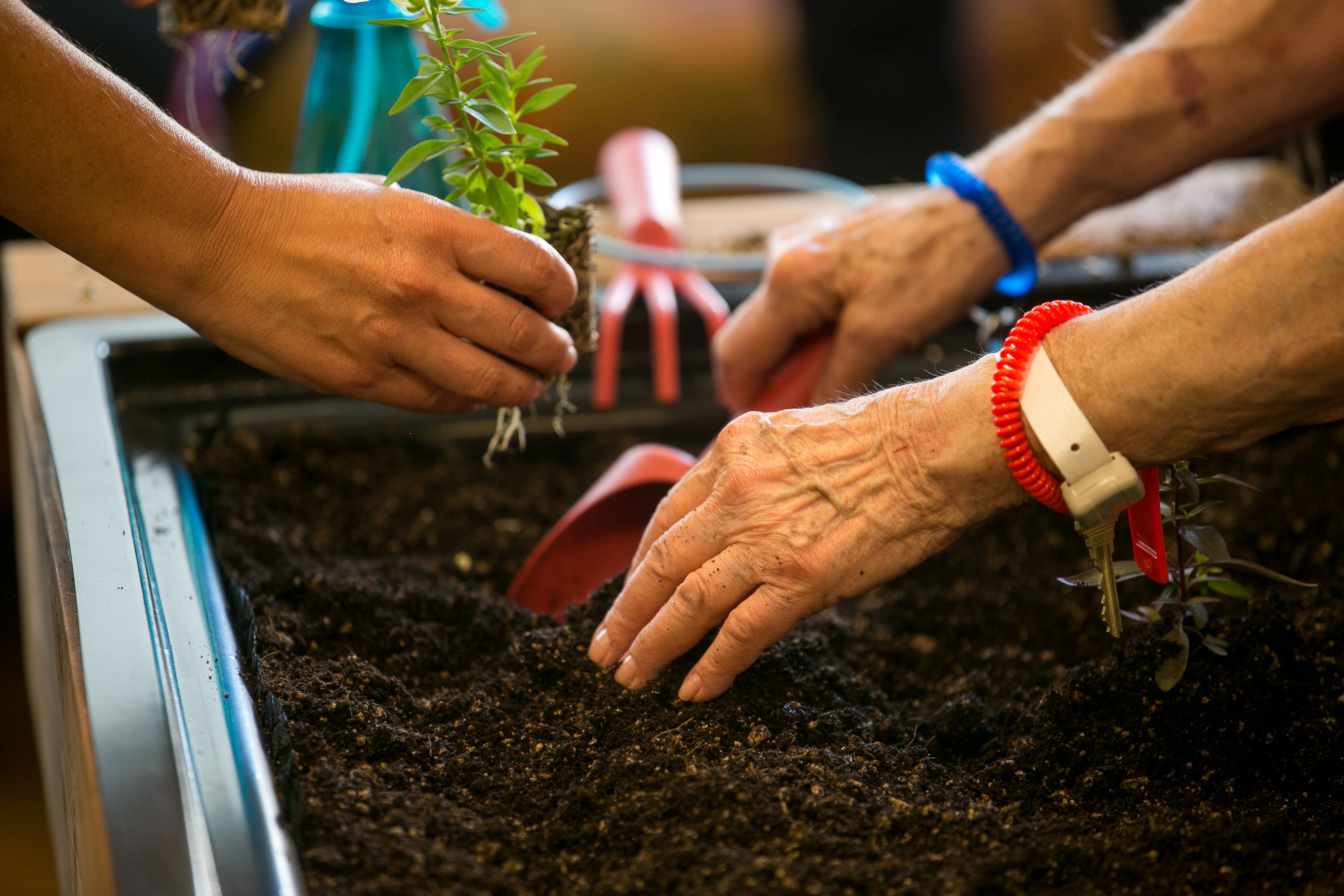Doll therapy is a valuable non-pharmacological (non-medical) approach for individuals living with dementia, offering comfort, reducing anxiety, and enhancing quality of life. Key benefits in...

What is Therapeutic Horticulture and Why It Matters in Dementia Care
by Valerie Larochelle, CEO and Co-founder of Eugeria
5-minute read
Gardening is one of those simple pleasures many of us take for granted. The smell of fresh soil, the feel of leaves between your fingers, the quiet satisfaction of seeing something grow—it’s grounding. It’s calming. And for people living with dementia, it can be so much more.
Whether you're a caregiver caring for a loved one or a professional working in a senior living community, you’ve probably seen how challenging it can be to find activities that are both engaging and meaningful. That’s where therapeutic horticulture comes in: gardening can bring comfort, connection, calm, joy, and, when done with intention, simple plant-based activities can become therapeutic, engaging the senses and supporting overall well-being.
In this post, we’ll explore what therapeutic horticulture really means, how it’s different from casual gardening, and why it matters—for people living with dementia, their families, and their care teams.
So, what is therapeutic horticulture?
Therapeutic horticulture is the intentional use of gardening and plant-related activities to support emotional, cognitive, and physical health. It can happen almost anywhere: in a courtyard garden, at a dining table, or even on a windowsill - it might look like planting herbs in a small pot, arranging flowers in a vase, or even just watering a few houseplants together.
What makes it “therapeutic” isn’t the setting—it’s the purpose. Activities are adapted to suit the abilities of the person living with dementia and guided in a way that support emotional connection, stimulate memory or help with coordination and movement.
Unlike everyday gardening, which is often focused on results (like growing food or keeping up the yard), therapeutic horticulture focuses on the process—how the activity makes the person feel, what it helps them remember, or how it connects them to others.
These activities can be led by trained professionals, staff in care communities, or family caregivers. No green thumb required—just a little creativity and patience.
Why does it matter in dementia care?
Dementia often affects memory, language, and the ability to follow complex tasks. But many people living with dementia still have strong emotional and sensory memories—especially from childhood or earlier in life. Nature has a special way of grounding us, offering moments of peace and presence. For people living with dementia, therapeutic horticulture can open a door to memories, emotions, and skills that remain—even as other abilities change.
For someone who spent time gardening in their younger years, activities like watering flowers, touching soil, or smelling fresh herbs can trigger long-term memories and bring a comforting sense of identity and purpose.
For caregivers, whether at home or in a care setting, plant-based activities offer a way to connect meaningfully without relying solely on words. These simple moments—planting a seed together, arranging a bouquet, smelling basil—can become part of your care routine and create genuine moments of joy.
How therapeutic horticulture helps people living with dementia.
- It stimulates the brain. Gardening encourages attention, memory, and sequencing. Whether it’s following steps to plant seeds or identifying the scent of herbs, these activities activate different parts of the brain in gentle, familiar ways.
- It supports emotional well-being. Spending time with plants has been shown to reduce stress and promote calm. For people living with dementia, therapeutic gardening can ease anxiety, reduce agitation, and offer a quiet sense of accomplishment.
- It encourages movement. From pinching seeds to handling watering cans, gardening naturally supports both fine and gross motor movement. Activities can be adapted for all mobility levels—whether done standing, seated, or with assistance.
- It builds social connection. Whether it’s a shared project at home or a group activity in a care community, gardening encourages conversation, cooperation, and storytelling. It’s a beautiful way to bring people together and create shared experiences.
Why It’s Gaining Attention Now
More and more, families and care professionals are looking for ways to support people living with dementia beyond medication. Activities that are sensory-based, emotionally meaningful, and rooted in everyday life are gaining attention—and with good reason.
As more families and care teams explore non-pharmacological approaches to dementia care, therapeutic horticulture stands out for its simplicity, accessibility, and proven impact.
More studies are highlighting the benefits of nature-based interventions—from improving mood and focus to decreasing responsive behaviors like restlessness or aggression. And with growing interest in person-centered, meaningful engagement, plant-based activities offer a way to care for the whole person—not just manage symptoms.
Whether you’re looking to enrich daily life at home or add value to your care programming, therapeutic horticulture checks all the boxes: it’s practical, flexible, and doesn’t require fancy equipment. You can try it indoors, outdoors, with a group, or one-on-one. And most importantly, it focuses on what the person *can* still enjoy and do.
Final Thoughts
Therapeutic horticulture isn’t about building perfect gardens. It’s about creating moments—of peace, of purpose, of connection.
Whether you’re working with a loved one at home or looking to enhance engagement in a care community, a little greenery can go a long way. Even a single plant on the windowsill can bring light and life into someone’s day.
🌱 Ready to Dig In?
Looking for ideas to try at home or in your community?
Our next posts will share practical ways to bring these benefits to life—subscribe to get them first!

